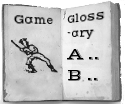Tip-Cat: Difference between revisions
(Set Game Eras to Predecessor) |
No edit summary |
||
| Line 2: | Line 2: | ||
|Term=Tip-Cat | |Term=Tip-Cat | ||
|Game Family=Baseball | |Game Family=Baseball | ||
|Description=<p>Strutt (1801) says there were various versions of Tip-Cat, and describes two of them. The first is basically a fungo game: a batter stands at the center of a circle and hits the cat a prescribed distance. Failing that, another player replaces him. (A similar version appears in The | |Game Eras=Predecessor | ||
|Sources=<p>Joseph Strutt, | |Invented Game=No | ||
|Description=<p>Strutt (1801) says there were various versions of Tip-Cat, and describes two of them. The first is basically a fungo game: a batter stands at the center of a circle and hits the cat a prescribed distance. Failing that, another player replaces him. (A similar version appears in The Boy’s Handy Book, but adds the feature that the fielding player tries to return the cat to the hitter’s circle such that the hitter does not hit it away again.)</p> | |||
<p>In a second version, holes are made in a regular circle, and each is defended by an in-team player. The players advance after the cat is hit away by one of them, but they can be put out if a cat crosses them - that is, it passes between them and the next hole. Gomme (1898) notes that in some places runners are put out be being hit with the cat, and three misses makes an out. She adds that Tip-Cat was “once commonly played in London streets, now forbidden.” Writing in 1864, Dick noted that Tip-Cat was only rarely being played in the U.S. In 1896, however, Beard was experiencing a revival in the US, Germany, Italy, “and even in Hindostand,” whereas in about 1850 it had been confined to “rustics on England.” Richardson (1848) notes Tip-Cat’s resemblance to [[Single-Wicket Cricket]]. “Twenty-one [runs] is usually a game,” he adds. The earliest reference to a cat-stick we have is the 1775 report that a witness to the Boston Massacre carried a cat-stick with him.</p> | |||
|Sources=<p>Joseph Strutt, <em>The Sports and Pastimes of the People of England—a New Edition, Much Enlarged and Corrected by J. Charles Fox</em> (????? (Reissued by Singing Tree Press, Detroit, 1968), 1903)., pages 109-110</p> | |||
<p><em>The Boy's Handy Book</em>., page 14.</p> | <p><em>The Boy's Handy Book</em>., page 14.</p> | ||
<p>Gomme,<em> | <p>Gomme,<em> Traditional Games of England, Scotland, and Ireland, Volume 1</em>. pages 294-295.</p> | ||
<p>Dick, ed., | <p>Dick, ed., <em>Dick and Fitzgerald, the American Boys Book of Sports and Games: A Practical Guide to Indoor and Outdoor Amusements (Lyons Press Reprint, 2000). Originally Published in 1864.</em>, pages 117-118.</p> | ||
<p>D. C. Beard, | <p>D. C. Beard, <em>The American Boy’s Book of Sport</em> (Scribner’s Sons, New York, 1896), page 332.</p> | ||
<p>H. D. Richardson, | <p>H. D. Richardson, <em>Holiday</em><em> Sports and Pastimes for Boys,</em> (Wm S. Orr, London, 1848), pages 63-64.</p> | ||
| | |Has Supplemental Text=No | ||
}} | }} | ||
Revision as of 16:23, 13 March 2017
| Game | Tip-Cat |
|---|---|
| Game Family | Baseball |
| Location | |
| Regions | |
| Eras | Predecessor |
| Invented | No |
| Tags | |
| Description | Strutt (1801) says there were various versions of Tip-Cat, and describes two of them. The first is basically a fungo game: a batter stands at the center of a circle and hits the cat a prescribed distance. Failing that, another player replaces him. (A similar version appears in The Boy’s Handy Book, but adds the feature that the fielding player tries to return the cat to the hitter’s circle such that the hitter does not hit it away again.) In a second version, holes are made in a regular circle, and each is defended by an in-team player. The players advance after the cat is hit away by one of them, but they can be put out if a cat crosses them - that is, it passes between them and the next hole. Gomme (1898) notes that in some places runners are put out be being hit with the cat, and three misses makes an out. She adds that Tip-Cat was “once commonly played in London streets, now forbidden.” Writing in 1864, Dick noted that Tip-Cat was only rarely being played in the U.S. In 1896, however, Beard was experiencing a revival in the US, Germany, Italy, “and even in Hindostand,” whereas in about 1850 it had been confined to “rustics on England.” Richardson (1848) notes Tip-Cat’s resemblance to Single-Wicket Cricket. “Twenty-one [runs] is usually a game,” he adds. The earliest reference to a cat-stick we have is the 1775 report that a witness to the Boston Massacre carried a cat-stick with him. |
| Sources | Joseph Strutt, The Sports and Pastimes of the People of England—a New Edition, Much Enlarged and Corrected by J. Charles Fox (????? (Reissued by Singing Tree Press, Detroit, 1968), 1903)., pages 109-110 The Boy's Handy Book., page 14. Gomme, Traditional Games of England, Scotland, and Ireland, Volume 1. pages 294-295. Dick, ed., Dick and Fitzgerald, the American Boys Book of Sports and Games: A Practical Guide to Indoor and Outdoor Amusements (Lyons Press Reprint, 2000). Originally Published in 1864., pages 117-118. D. C. Beard, The American Boy’s Book of Sport (Scribner’s Sons, New York, 1896), page 332. H. D. Richardson, Holiday Sports and Pastimes for Boys, (Wm S. Orr, London, 1848), pages 63-64. |
| Source Image | [[Image:|left|thumb]] |
| Comment | Edit with form to add a comment |
| Query | Edit with form to add a query |
| Has Supplemental Text |
Comments
<comments voting="Plus" />
